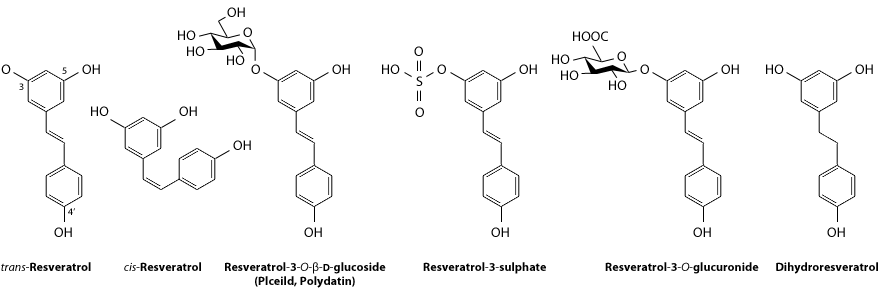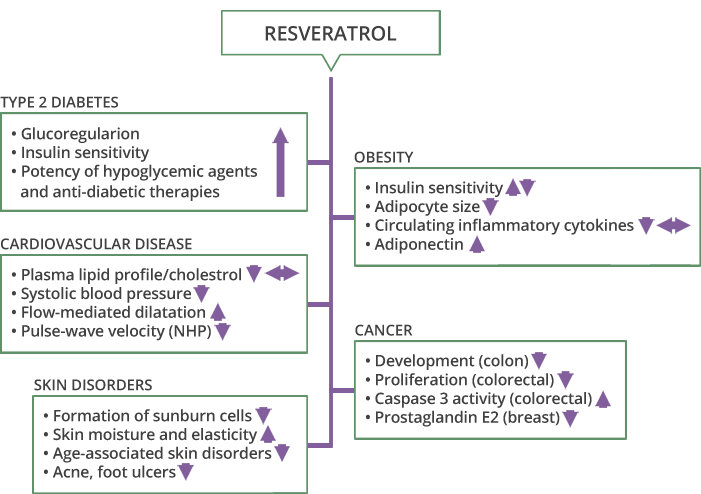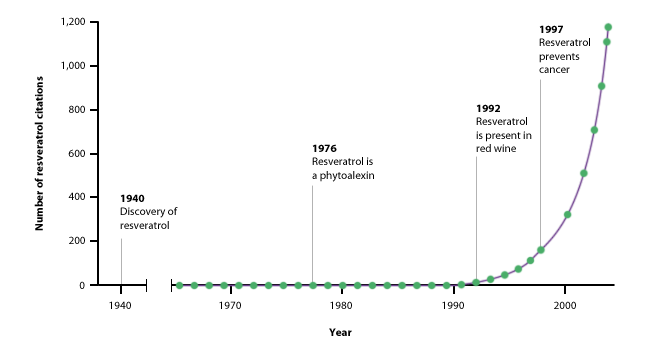What is Resveratrol
Resveratrol (3,5,4′-trihydroxy-trans-stilbene) was first isolated from the root of white hellebore (Veractrum grundiforum O. Loes) in 1940, and later in 1963, from the roots of Polygonum cuspidatum, a plant used in traditional Chinese and Japanese medicine. Initially characterized as a phytoalexin, resveratrol attracted little interest until 1992, when it was postulated to explain some of the cardiprotective effects of red wine.

Figure 1. Trans-resveratrol and related structures. Piceid (trans-resveratrol-3-O-ß-D glucoside) is found in grapes and other natural sources of resveratrol. Resveratrol-3-sulphate, resveratrol-3-O-glucuronide and dihydroresveratrol are metabolites of resveratrol. The positions of hydroxyl groups are indicated on the parent molecule (Baur, J. A. & Sinclair, D. A. Nature Reviews Drug Discovery 2006).
Resveratrol and the French Paradox
Since the beginning of the 1992s, various reports began to emerge that resveratrol, a compound present in red wine, might contribute in part to the “French Paradox”, a phenomenon that refers to the relatively low rate of cardiovascular disease (CVD) in France despite high intake of dietary saturated fat (Renaud and de Lorgeril, 1992).
Resveratrol (3,5,4′-trihydroxytransstilbene, RSV) is a small polyphenolic compound found in various berries, nuts, grapes, and other plant sources, including traditional Asian medicines. Although this polyphenol exists as cis- and trans-isomers, trans-RSV is the preeminent and biological active form found in dietary sources and supplements.
The growing interest in the use RSV is due to its protection against inflammation, oxidative stress, heart disease, diabetes, liver disease, neurodegenerative disorders, cancer and as a caloric restriction the mimetic (Baur and Sinclair, 2006; Cottart et al., 2014). RSV has gained considerable interest in the medical community as a possible preventative agent for several human chronic diseases (Baur and Sinclair, 2006).
Safety of Resveratrol
Biological Effects of Resveratrol in Humans

Figure 2. Summary of the effects of resveratrol in human clinical trials when conducted in patients with type 2 diabetes, obesity, cardiovascular disease, cancer or skin disorders. The symbol ? denotes lack effect, and ?? opposite action in some trials (Novelle et al., Aging Research Reviews, 2015).
Resveratrol’s many benefits are being widely studied
The number of scientific publication on reseveratrol as shown in Figure 3 has exploded since the benefits of red wine were first postulated by Renaud and de Lorgeril, 1992. This is an indication of the importance of resveratrol to health and wellbeing.

Figure 3. Resveratrol citations appearing on PubMed as function of year. The PubMed databases was searched using the key word “resveratrol”. The plot shows the cumulative number of scientific publication identified for each year after the creation of Medline in 1963. Data from Baur and Sinclair, 2006. The total number of scientific publications on resveratrol can also be obtained on Google Scholar under the subheading “in the title of the article”. The total number of publications up to 2015 was 12,400 with the publication in 2015 alone being 1190. Clearly, the enormity of the scientific research is a reflection of the many benefits of reseveratrol to Health and Wellbeing.
Summary of recent publications on the multiple benefits of resveratrol
The results of a recent symposium on resveratrol have been published in Biochimica et Biophysica ACTA- Molecular Basis of Disease, 2015. The titles of these publication and others given below. The abstract and full publication can be obtained by clicking on the title.
Amount of duration of resveratrol intake
Trans-resveratrol 98% should be taken over long period of time from Health Canada recommended a rate of 500 mg/day (2 × 250 mg/cap) in order to receive its full benefits.
ALLNatural Nutritional Products (ANNP) Inc. has been issued a licence from Health Canada to market its resveratrol under the brand name of ALLNatural Resveratrol 98%, Super strength. A Natural Product Number (NPN 80024931) is a requirement for sale of all nutritional products.
Scientific reviews on the benefits of resveratrol


